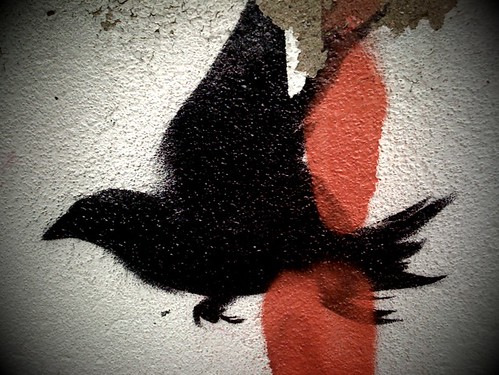 Good morning! What’s happening for you today? I’m on the other side of this sick, thank goodness, still soothing a raw nose but able to breathe relatively normally again. Outside the weather’s warm like breath, and standing at my front door, I watch as a fat crow lands in the front yard and hops around, poking into the grass for something tasty. I imagine sitting on the stoop, having hir hop up over to me, getting to rest my hand on hir feathers, getting to heft hir weight. Ze goes the other way, though, through a break in the white plastic-picket fence and onto the sidewalk. I come back inside.
Good morning! What’s happening for you today? I’m on the other side of this sick, thank goodness, still soothing a raw nose but able to breathe relatively normally again. Outside the weather’s warm like breath, and standing at my front door, I watch as a fat crow lands in the front yard and hops around, poking into the grass for something tasty. I imagine sitting on the stoop, having hir hop up over to me, getting to rest my hand on hir feathers, getting to heft hir weight. Ze goes the other way, though, through a break in the white plastic-picket fence and onto the sidewalk. I come back inside.
~~~~~~~~~~~~~~~~~~~~~~~~~~~~~~~~~~~~~~~~~~~~~~~~
Here’s something I put into the grant application I sent off last night:
As an incested erotic writer and creator of genre-defying creative nonfiction, I am also a performer and writer-facilitator of writing workshops wherein participants create new work at every meeting; each workshop session is a surprising, experiential, transformative art process.
I like getting to use this language, this academic-grant-y language. It lets me set my eyes to a different sort of truth than I usually name around the workshops. It lets me set something else into possibility, I think. Also, I think it’s true.
~~~~~~~~~~~~~~~~~~~~~~~~~~~~~~~~~~~~~~~~~~~~~~~~
I get to hang outwith Jianda Monique on her Lesbian Relationships podcast (on BlogTalkRadio) here in just a few hours now! 3pm pst/4pm mst (that’s as far as we’ve gotten with the time zone conversion) — I’m looking forward to chatting with her about the workshops, about transformative writing, about the possibilities for sexual healing, and whatever else she comes up with!
~~~~~~~~~~~~~~~~~~~~~~~~~~~~~~~~~~~~~~~~~~~~~~~~
This morning I’ve been working on my presentation for the workshop I’ll offer at the Transformative Language Arts Network‘s annual Power of Words conference next week, “Reclaiming the Erotic Story: The Liberatory Potential of Writing Desire”. (As a side note: I kind of like that title! I don’t at all remember creating it… whew.)
Here’s some of what I’ve said before about erotic writing as transformative practice, in an essay I often hand out at erotic writing retreats:
What happens when we all have a wider access to erotic language and sexual expression – when the full breadth of our erotic power can challenge the mainstream Western sexual conversation which is both so puritan and so hyper-sexual? When we try our hand at some explicit writing, and discuss what it means to engage more critically and imaginatively with the messages we all have received (both directly and indirectly) about such things as sexual identity, body image, sexual desire, sexual practice, and more, we can reconsider what we’ve been taught about desire and language and dive fully into the much greater possibilities of and through each.
There’s a Dorothy Allison quote I like to pass out to new erotic writers, in which she describes the importance of learning to write sex:
If I hadn’t learned to write about sex, and particularly to write about my own sexual desires, I don’t think I would have survived. I think the guilt, the terror I grew up with was so extraordinarily powerful that if I had not written my way out of it, I’d be dead …And I think it’s vital [to write about], aside from whether it ever becomes good fiction, particularly for women with transgressive sexuality…[or] people who in any way feel their sexuality cannot be expressed. Writing can be a way to find a way to be real and sane in the world, even if it feels a little crazy while you’re doing it. (From The Joy of Writing About Sex, by Elizabeth Benedict)People sometimes still, I think, may take erotic writing to be frivolous work, but in my experience, this writing is where some wholly deep transformations occur, and where enormous risks are taken.
[…] Erotic writing is and is not just about writing about sex. It also can be about expanding one’s own possibility through language. For me, erotic writing has created internal space for previously unexpressed desire, wish, need – which has not been confined to the sexual realm.
That last there is where the liberatory potential resides (liberation: when something or someone is released or made free; the state of not being in confinement or servitude): how we can liberate ourselves and one another into a much greater erotic/sexual complexity than our current American society prefers/allows, and how that liberation creates the ripple effects for more and more erotic desire to permeate the rest of our lives…
More about this as we get closer to the conference. And hey! Registration is still open! If you’re near (or want to be near) Plainfield, Vermont, next week, and you do or want to do work around/with writing/storytelling/song/theater/words as change agents/transformative practices for individuals, communities, societies — it’d be so amazing to be with you at the Power of Words conference. Will you think about it? Maybe pass the word to friends you’ve got in New England?
(Note that I still don’t know where I’m staying — maybe we’ll all rent a hotel room together!)
Thanks for your fierce gentleness with yourself today, at least that one time when you looked in the mirror. Thanks for your words, always.
